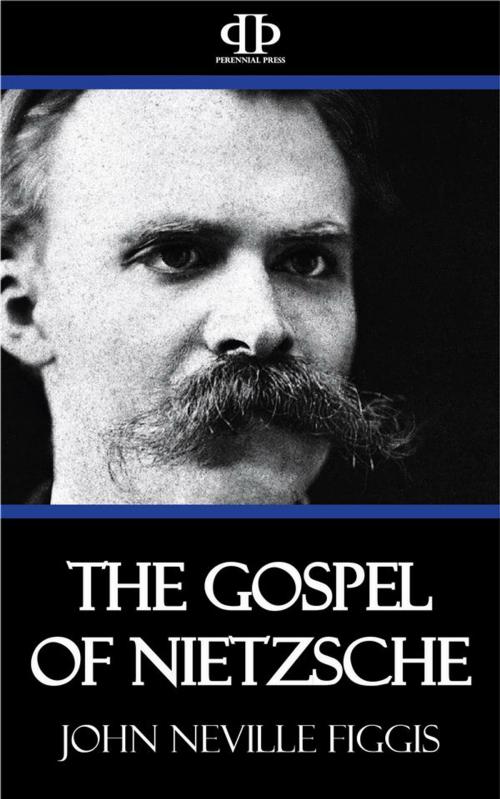The Gospel of Nietzsche
Nonfiction, Religion & Spirituality, Philosophy, Existentialism, Good & Evil, Biography & Memoir, Philosophers| Author: | John Neville Figgis | ISBN: | 9781518363290 |
| Publisher: | Perennial Press | Publication: | January 7, 2016 |
| Imprint: | Language: | English |
| Author: | John Neville Figgis |
| ISBN: | 9781518363290 |
| Publisher: | Perennial Press |
| Publication: | January 7, 2016 |
| Imprint: | |
| Language: | English |
IT is related of Archbishop Benson that when he first made acquaintance with London society he asked in his bewilderment: "What do these people believe?" If he were alive to-day he would suffer a like astonishment, but his question would rather take the form: "What don't these people believe?" So strange is the welter of creeds and sects, of religions and irreligious, moralists and immoralists, mystics, rationalists, and realists, and even Christians, that it is hard to guess what nostrum may be dominant with your nextdoor neighbour. It may be a dietetic evangel, it may be an atheistic apocalypse. One phenomenon, not the least notable of our day, is the rejection by large numbers of all the values, which even in the broadest sense could be called Christian. It is not of Christianity as a creed, but Christianity as a way that I speak. Christianity involves many other elements, but it is, as we observe it, a way of life. It selects and sets its value on certain kinds of character. It is the most developed, though by no means the only form of the philosophy of Love. We now know that it gathered up into itself many tendencies at work in systems previously existing. The words Homo sum, humani nihil a me alienum puto were written by a Pagan playwright a century and a half before the foundation of Christianity. Yet they found their full significance therein, and were, like many presuppositions of the great Roman jurists, ultimately destructive of the slave-basis of the ancient world. Many of these Christian values, at least the stress laid on common fellowship and unselfishness, are preserved, with what degree of legitimacy we need not inquire, by many who reject the Christian faith. The Religion of Humanity as set forth by Auguste Comte is agnostic in its attitude to the other world, but its conception of duty as between man and man is not very different from the Christian. Adam Smith wrote a book, less famous than the Wealth of Nations, designed to show the origin of all morality in sympathy. Modern altruism in its varied forms may be traced not obscurely to Christian influence, although even ethically it is not identical therewith...
IT is related of Archbishop Benson that when he first made acquaintance with London society he asked in his bewilderment: "What do these people believe?" If he were alive to-day he would suffer a like astonishment, but his question would rather take the form: "What don't these people believe?" So strange is the welter of creeds and sects, of religions and irreligious, moralists and immoralists, mystics, rationalists, and realists, and even Christians, that it is hard to guess what nostrum may be dominant with your nextdoor neighbour. It may be a dietetic evangel, it may be an atheistic apocalypse. One phenomenon, not the least notable of our day, is the rejection by large numbers of all the values, which even in the broadest sense could be called Christian. It is not of Christianity as a creed, but Christianity as a way that I speak. Christianity involves many other elements, but it is, as we observe it, a way of life. It selects and sets its value on certain kinds of character. It is the most developed, though by no means the only form of the philosophy of Love. We now know that it gathered up into itself many tendencies at work in systems previously existing. The words Homo sum, humani nihil a me alienum puto were written by a Pagan playwright a century and a half before the foundation of Christianity. Yet they found their full significance therein, and were, like many presuppositions of the great Roman jurists, ultimately destructive of the slave-basis of the ancient world. Many of these Christian values, at least the stress laid on common fellowship and unselfishness, are preserved, with what degree of legitimacy we need not inquire, by many who reject the Christian faith. The Religion of Humanity as set forth by Auguste Comte is agnostic in its attitude to the other world, but its conception of duty as between man and man is not very different from the Christian. Adam Smith wrote a book, less famous than the Wealth of Nations, designed to show the origin of all morality in sympathy. Modern altruism in its varied forms may be traced not obscurely to Christian influence, although even ethically it is not identical therewith...















